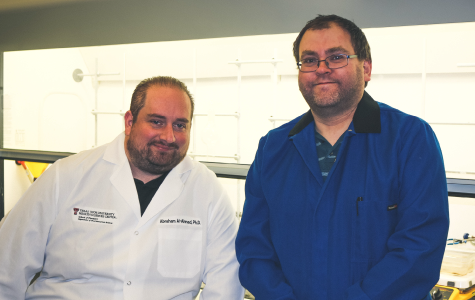Amarillo researchers identify promising compounds to treat neurodegenerative diseases

Abraham Al-Ahmad and Paul Trippier
A study published in the November issue of the Journal of Medicinal Chemistry, the nation’s leading medicinal chemistry journal, describes new compounds designed and synthetized in the lab of Paul Trippier, Ph.D., that show the effects of protecting human neurons in a dish from a form of cell death common in neurodegenerative diseases such as Alzheimer’s disease and Parkinson’s disease.
Trippier is an assistant professor for the Department of Pharmaceutical Sciences at the Texas Tech University Health Sciences Center (TTUHSC) School of Pharmacy in Amarillo. He is collaborating with the lab of Abraham Al-Ahmad, an assistant professor in the same TTUHSC School of Pharmacy department.
Trippier said the TTUHSC research team grew functional human neurons from stem cells and then treated them with the synthesized compounds. When cell death was induced, many more neurons that had been treated with the new compounds survived than did those that were not treated.
“These compounds are in the early stages of drug discovery, but they show promise for the treatment of many different types of neurodegenerative disease,” Trippier said. “The advantage to this study is the use of stem cell-derived functional human neurons. Many studies have identified compounds that can protect either neuron-like cells or mouse neurons, but they rarely carry forward to show effect in humans.”
As the compounds developed in his and Al-Alamad’s labs already show effect in human neurons, Trippier said they are much more likely to be effective in patients, albeit in the distant future.
Related Stories
Celebrating Veterans: TTUHSC’s General Martin Clay’s Legacy of Service and Leadership
From his initial enlistment in the Army National Guard 36 years ago to his leadership in military and civilian health care management roles, Major General Martin Clay’s career has been shaped by adaptability, mission focus and service to others.
Texas Tech University Health Sciences Center School of Nursing Named Best Accelerated Bachelor of Science in Nursing Program in Texas
The TTUHSC School of Nursing Accelerated Bachelor of Science in Nursing (BSN) program has been ranked the No. 1 accelerated nursing program in Texas by RegisteredNursing.org.
TTUHSC Names New Regional Dean for the School of Nursing
Louise Rice, DNP, RN, has been named regional dean of the TTUHSC School of Nursing on the Amarillo campus.
Recent Stories
National Academy of Inventors Names TTUHSC Faculty Senior Members
The National Academy of Inventors (NAI) has designated two current and one former TTUHSC faculty researchers as Senior Members.
The John Wayne Cancer Foundation Surgical Oncology Fellowship Program at Texas Tech University Health Sciences Center Announced
TTUHSC is collaborating with the John Wayne Cancer Foundation and has established the Big Cure Endowment, which supports the university’s efforts to reduce cancer incidence and increase survivability of people in rural and underserved areas.
TTUHSC Receives $1 Million Gift from Amarillo National Bank to Expand and Enhance Pediatric Care in the Panhandle
TTUHSC School of Medicine leaders accepted a $1 million philanthropic gift from Amarillo National Bank on Tuesday (Feb. 10), marking a transformational investment in pediatric care for the Texas Panhandle.
